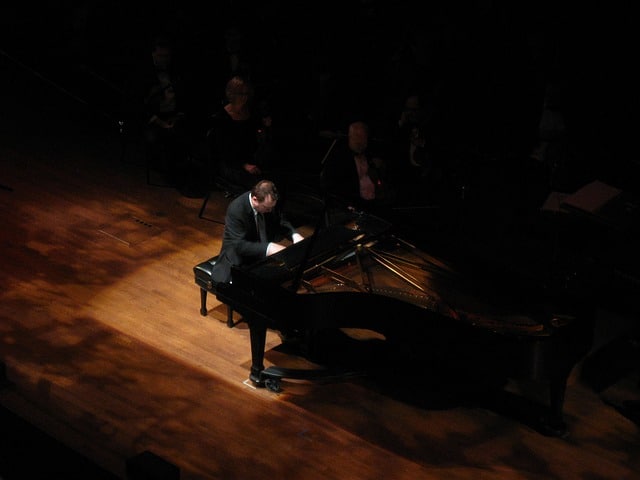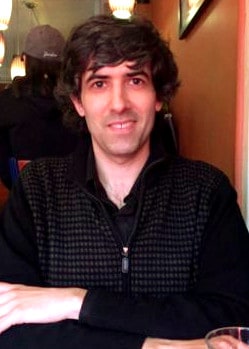Mindful Piano Basics
If you suspect that learning piano is more frustrating than it needs to be, you're right.
It's time to end the confusion, cut through the nonsense, and discover a simple way of playing the piano that works. Develop your personal practice with this online piano course.
Let me ask you:
So, why isn't it happening?
I imagine that this isn't the first time you've tried learning a musical instrument. Am I right?
How do they make it seem so easy!?
Watching a professional pianist like Lang Lang or Martha Argerich can be an awe-inspiring experience. They can seem engrossed in the music, completely connected to the piano. Their fingers fly about effortlessly.

Trying to play the piano yourself can be the exact opposite of “motivating”. Your fingers do not do what you tell them to do. The music is overwhelmingly complex.
When you hear that professionals generally start at the age of 4 or 5 (or sometimes earlier!), you're left wondering “what hope is there for me?”
Nevertheless, you give it your best try, dedicating yourself to practicing the piano. You watch instructional videos, read books, maybe even sign up for weekly lessons with a teacher.
And you make some progress. But still, it feels difficult.
It just doesn't feel like music...
Even after learning to read music, it still takes forever to learn new pieces, because you have to work through them note-by-note.
Or, maybe you sit down to improvise your own music, which should be a relaxing, creative experience.
But, it’s not. The music doesn’t seem to flow naturally. You start with a good idea, but you run out of inspiration halfway through.
And if you're teaching yourself?
If you’re learning on your own, you might be overwhelmed and confused about how to proceed. How much sight-reading should you do? How should you practice it? Which piece should you learn next? How do you know if a piece is too hard or too easy for you?
When the goal is years away, it can seem like one wrong step will set you in the wrong direction permanently.
If you read this page to the end, you're going to discover how to feel like you're on the right path in your piano learning.
Hi, my name's Michael.
I'm a piano teacher with many years of experience playing and teaching the instrument. I've worked as a rehearsal pianist for opera productions, a vocal coach and choir director, and I have a master’s degree in piano.
My unusual style of teaching is influenced by my background in science, meditation, and a ton of personal experimentation. I get bored easily and I'm always trying to learn a new skill.


Yes, I am a professional musician now, but I wasn't always. Since I started learning the piano, I struggled with many things: poor technique, performance anxiety, constantly comparing myself to others.

Me during a recording session several years ago, feeling quite nervous!
I found myself playing the piano in high-pressure situations such as opera auditions and choir rehearsals. In these environments, a pianist is expected to sight-read unfamiliar music without any practice. It is not possible to take the time to stop and figure out notes or fingerings; one must play expressively, at speed, while simultaneously being aware of one's surroundings (including a conductor or singers).
My deficiencies soon became apparent. Sight-reading was always a strength of mine, but in this high-pressure environment, any hesitation is fatal. Tension accumulated in my body, making it difficult to rely on whatever piano technique I had. If something was difficult, I couldn't play fast.
I became extremely self-conscious, comparing myself to other pianists and noticing how much easier things seemed for them. Even 9-year-old kids on YouTube made me envious!
The problem I had was that my piano playing was not integrated from the ground up.
I realized I needed to go back to the beginning, and get to the root of my problems. I searched around for many different solutions to this problem.
I tried:
Reading books about:
- Performance anxiety
- Piano technique
Psychotherapy
Mindfulness
Guess what? This one actually worked!
That's when I realized it wasn't my fault.
This is how I had been taught.
If you go to a typical piano teacher, you will be given typical advice. The teacher will say things like:
"Try not to make mistakes!"
The teacher will instruct you to learn a piece of music, and play without mistakes. This is easier said than done. The teacher will correct your mistakes, and you might go home and even practice those corrections, but still, you will make mistakes.
Even if you understand intellectually what you're supposed to be playing, it might not stick. That's because you can't "muscle" your way to the right notes. You can't just "try harder". Seriously, try it.
"Keep your fingers curved!"
Even if you have no problem hitting the right notes, you still have to contend with the fact that it's hard to move your fingers in the right way.
This is because playing the piano is complicated. It's like learning to ride a bicycle. You can't just hop on and expect things to go well.
Yet, if you've ridden a bicycle, you know that it's pretty easy once you get the hang of it. That's because there are only three things to do: pedal, steer, and brake.
That's it. All of that complexity is reduced to just three basic steps.
Do you know how to do that with piano playing? Do you think the average piano teacher knows how?
"Follow the traditions!"
Your teacher may give you some exercises to do. But, those exercises are probably based more on tradition than they are on your unique situation. Or, your teacher may give you vague instructions such as "play more lightly", or "use more weight." These are subjective descriptions that make more sense to the teacher than they do to you.
You don't need subjective descriptions. You don't need words. You need an experience that teaches you something that you can understand.
"Be musical!"
Yes, you will learn "how to push the right buttons." But that is not music. Music is expressive and creative.
- Button-pushing is neither expressive nor creative.
- Worrying about mistakes is neither expressive nor creative.
Until you are connected to the music, you will find it impossible to express anything. You will be worried about your mistakes, and you will feel awkward and uncoordinated.
Playing the piano must be as natural as speaking. Just imagine trying to say something meaningful in a conversation if you are worried about how to move your lips, or exactly which words to use. You can't do it. It's impossible. Yet, this is how music is normally taught.
"Because I said so!"
In a traditional piano lesson, the teacher will make corrections and you will be expected to agree with them. Even if they make no sense to you. Even if you are unsuccessful in incorporating them into your playing.
This is because, in a traditional piano lesson, the teacher is the gatekeeper. They alone get to decide if you are worthy of playing the music of the great composers.
But, this is not why you want to learn the piano, I'm sure. You want to learn because it's fun and exciting for you.
You don't need someone telling you that what you're doing is wrong. You need someone to stand behind you and help you achieve your goals. You need a way of learning that helps you understand your experience.
The real problem is the conventional attitude of classical music. That is what was keeping me from claiming my own power as a musician.
Once I realized that I could learn based on my own experience, things started to move much more quickly.
Surprisingly, I discovered that not only did my piano playing improve, but I also found myself with many other benefits. For example:
Introducing a new online piano course...
Mindful Piano Basics
This is an online video course that will teach you a new way of playing the piano, based on mindfulness. You will learn how to get in touch with your body, so that playing feels effortless and easy. You will learn how to understand the barriers that your mind creates, which are getting in the way of your progress.
This course has taken me months to create.
It has cost me countless hours of frustration. But it has been totally worth it.
This is going to make things so much easier for you. You will not have to grope around in the dark wondering if what you're doing is effective or not.
Mindful Piano Basics is an online piano course that:
Here’s what people are saying about the course instructor:
"teaches how to trust yourself"
What I appreciate the most of Michael’s lessons is his method. He invites you to approach practice not as a dreary task but as problem solving. I discovered the excitement that comes with overcoming musical difficulties. He supports you in bringing up your musical vitality to full potential. He teaches how to trust yourself.

Would you like access to Mindful Piano Basics?
For less than the cost of a few private piano lessons, you can have access to everything in this course.
Now, while it would be impossible for me to show you all the benefits of Mindful Piano Basics, I want to show you some of the things that you'll experience when you enroll in this online piano course.
When you sign up, you will immediately have unlimited access to all of the video lessons in the course. The course is self-paced, so you are free to complete it on your own timeline. By the end of the course, you will have the confidence that you can take your piano playing in the direction that you want it to go in.
Play Effortlessly
Learn how to cut through the complexity of “piano technique.” Discover a set of simple principles and exercises that will show you how to develop an intuitive understanding of how to move your hands.
Learn Music Quickly and Easily
Once you understand how everything fits together in music, you will be able to learn new pieces easily. This goes beyond “reading music”, getting to the roots of what is contained within the musical notation.
Be Your Own Teacher
Teachers can be great, but you will be amazed at what will happen once you get in touch with your personal power. This does not replace teachers, but rather gives you the ability to see what they are seeing, so you can help yourself when you need to, and understand how to plan your long-term progress.
Connect With the Music In You
Music is supposed to be an art, and yet too often learning to play consists of boring and seemingly pointless drills. You will learn what separates great artists from amateurs, and how to access that creative energy within yourself.
What you will learn in this online piano course
Mindful Piano Basics contains the following modules:
1
Module 1: How to think like a musician
We will go over the basics of reading music. You will learn what the symbols mean, but more importantly, you will learn why the composer wrote them that way. We will cover how to read music in a way that immediately helps you play it on the piano.
2
Module 2: Making your body work for you, not against you
We will discuss the obstacles that musicians always create for themselves, which makes playing the piano unnecessarily difficult. You will learn a technique for uncovering technical difficulties in any piece, no matter how complex or how simple. You will learn practical exercises for getting in touch with your body, and how to connect it to the music you’re playing.
3
Module 3: Being your own teacher
We will discuss how to practice the piano with an eye toward long-term progress. You will learn how to develop the kind of ear and understanding that a piano teacher has so that you can start to make confident decisions about what’s best for you. You will learn exercises for sight-reading that make it possible to approach any piece, at any tempo.
Bonus
There's more
Also included in the course are the following bonuses:
3 video evaluation sessions
Even though this is a self-paced online piano course, it is still useful to have feedback from a teacher. When you enroll in the course, you will have the opportunity to submit 3 videos of your practicing and receive written feedback. This will allow you to check if you are doing the exercises correctly.
Lifetime access and updates
You will have access to the course forever. This includes access to any updates or new lessons that are added to this course.
Workbook
The course includes a downloadable workbook with written exercises. These exercises will challenge you to think deeply about the material in the course and encourage you in self-discovery.
Let’s talk about how a typical piano lesson works.
You will play a piece for your teacher, and the teacher will give some constructive criticism. You might receive feedback on your fingering choices (which fingers you use to play which keys), your dynamics (how loud or how soft you play), or perhaps you will get some technical advice. The teacher will instruct you on what to practice for the next lesson, and you will be expected to do so over the next 6 days. The following week, this process will repeat itself.
These lessons are expensive. A piano teacher in my area will typically charge at least $60 for a one-hour lesson, and usually more. I have personally paid $200 for a single lesson in New York City, and I know this isn’t the upper limit!
The material in this online piano course is concrete and includes actionable exercises to reinforce the important points. If you do the exercises, you will learn. And, you will not have to come back week after week with no end in sight.
Imagine signing up for 6 months of piano lessons.
Let’s say that’s 24 lessons at $60 each.
This comes to a total of $1,440.
Now, let me ask you something.
If all you got for that price was the ability to truly enjoy the sound of your own improvisations at the piano, would it be worth it?
If all you got was an end to the confusion about piano technique, would it be worth it?
If all you got was the ability to explore the vast library of piano music on your own, would it be worth it?
If all you got was the confidence that you were on the right path, would it be worth it?
If all you got was the feeling of being a real artist, would it be worth it?
I am not going to ask you for $1,440 for Mindful Piano Basics.
Enter your text here...
Mindful Piano Basics
Enroll now
$200

100% Satisfaction Guarantee for 30-Days
Try Mindful Piano Basics risk-free for 30 days.
If for any reason, you feel you are not benefiting from the material in the course within 30 days, I will refund 100% of your payment.
I have no interest in tricking people into paying me for this. I want you to buy this online piano course happily because it offers real value to you.
Just imagine what life will be like when you:
The point is mastery. Even as a beginner, you should be working towards this goal. You want control over what you’re doing. This is about tapping into your unique artistry and talent.
Music should be simple to understand. When things are simple, you have the freedom to explore, to learn, to create. If you’re overwhelmed by details, without having a context to put them in, you may as well be walking around in chains.
This course will give you knowledge. Let me clarify that a bit, since the course itself cannot give you anything. The knowledge comes from your efforts, from the work that you do. And, this course will teach you exactly what effort you need to put in. Then, the knowledge (the result of your personal experience) will be yours forever.
This course is not for everyone.
Mindful Piano Basics is for beginning and intermediate pianists who want to try an unconventional approach to classical piano playing. It’s for people who are curious, rather than passive, and willing to question their assumptions. It’s for people who have realized that self-discovery is the way to personal empowerment.
Mindful Piano Basics might be for you if you:
Frequently Asked Questions
Am I too old to learn the piano?
This looks like a "master piano in 10 days" sort of scheme. How can it be that easy?
Am I talented enough to learn the piano?
What if I have bad habits from other teachers?
Don’t you need a piano teacher to learn the piano?
I don't like reading music. Why should I take this course?
I'm not interested in classical piano. Why should I take this course?
Is this course too advanced for me?
Is this course too basic for me?
So click on the "Enroll Now" button below, and you'll be taken to a secure order form. After you put in your credit card information, you will be taken to the members-only area, where you will have 24-hour access to the course.
You can then begin the course any time you'd like.
Mindful Piano Basics
Enroll now
$200

Final Words
I believe that all human beings have the right and the potential to learn to play a musical instrument.
This path can be extremely difficult. Music can challenge us physically, emotionally, and mentally. But, that’s why it’s worth doing, right?
I am confident that if you put in the work, you will make progress. And that progress may be way beyond what you ever imagined possible.
You must, however, take action. If you keep doing whatever you've been doing, you'll stay exactly where you are. I know that sounds a little bit harsh. But, wouldn't you agree it's true?

